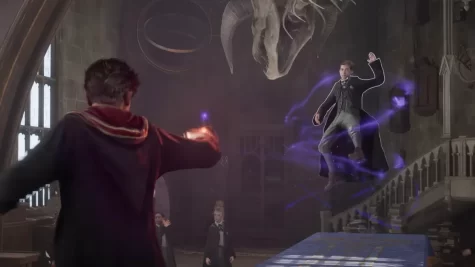Purchasing ‘Hogwarts Legacy’ supports transphobia
March 30, 2023
With more and more open-world video games popping up, it only makes sense that one of the highest-grossing media franchises would hop on the broom-wagon. 26 years after the first book in the “Harry Potter” series was published, the video game “Hogwarts Legacy” was released by Warner Bros under the Portkey Games label. It seems like many people are too caught up by the new game to consider “Harry Potter” author JK Rowling’s own legacy against the transgender community.
JK Rowling is a trans-exclusionary radical feminist, or “TERF” (not to be confused with an actual feminist). What this means is that her views of feminism don’t extend to transgender women. While Rowling has shown hints of transphobia since 2018, a retweet in June of 2020 made her perspective clear: “If sex isn’t real, there’s no same-sex attraction. If sex isn’t real, the lived reality of women globally is erased. I know and love trans people, but erasing the concept of sex removes the ability of many to meaningfully discuss their lives. It isn’t hate to speak the truth.” Rowling’s entire tweet was based upon a false simplification of the belief that someone’s sex does not determine their gender, not that sex doesn’t exist. And she’s been the cause of many pointless, transphobic Twitter arguments since.

Eventually, it got to the point where Daniel Radcliffe, Emma Watson and Rupert Grint, the main three cast members of the on-screen “Harry Potter” series, spoke out against the author and in support of the transgender community. Radcliffe responded via The Trevor Project, a nonprofit organization focused on preventing suicide among the LGBTQ+ community. After a statement regarding transgender women as a whole, he addressed the “Harry Potter” fans: “If you found anything in these stories that resonated with you and helped you at any time in your life—then that is between you and the book that you read, and it is sacred.” Radcliffe’s response caused other cast members to follow suit, helping the fanbase feel more comfortable after Rowling’s remarks.
Radcliffe’s quote falls under the stance that fans can separate art from the artist. That opinion is ever so evident now with the controversy over purchasing “Hogwarts Legacy”. Many people with those connections to “Harry Potter” feel inclined to purchase a game where they’re immersed into the world. There’s also a large audience of the gaming community, reading all the high reviews for the video game and wanting to play for themselves. But, while Rowling had no involvement with the production of “Hogwarts Legacy,” she stands to earn the royalties. Rowling already receives between $50 million to $100 million from royalties each year. While “Hogwarts Legacy” has only been available for seven months, it’s estimated that the game’s revenue will reach $221.40 billion in 2023. It’s not clear what percentage of that amount will go to Rowling, but she will certainly receive profit.
Though Rowling engages in transphobia most often, she also has a lengthy history in racism and anti-Semitism. Rowling’s character infamous for her offensive name, Cho Chang, is just one example of her problematic decisions. Cho is the only East-Asian character in “Harry Potter” and her name is simply the combination of a Korean surname (Cho) and a Chinese surname (Chang). She was also placed in Ravenclaw, the “Harry Potter” house full of eager-to-learn students who possess great wisdom. This goes along with the racist stereotype and cultural expectation for Asian people to be smarter and work harder than others. Rowling also named one of her few Black characters, Kingsley Shacklebolt. It doesn’t take much thought to see what Rowling implied when combining “shackle” and “bolt” as his last name. Rowling has also used multiple Irish stereotypes throughout her books. The founder of Slytherin house (known for being the “evil house”) was an Irishman, while the Gryffindor house (the “good house”) was founded by an English man, which appears to be referencing the idea that the Irish are evil and the English are heroes. A more obvious example of Rowling using Irish stereotypes is her naming of the only other Irish character, Seamus Finnigan. Lastly, Rowling has many disgusting examples anti-Semitism in the books. The only bank in the wizarding world, Gringotts, is run by little, money-grubbing (literal) goblins. Their greediness for money and their hooked-noses are a direct reference to anti-Semitic caricatures that were created during the Middle Ages (becoming most popular during World War II in a German tabloid newspaper, Der Stürmer). In an attempt to fix her reputation, Rowling created a Jewish character named Anthony Goldstein, only further solidifying her anti-Semitism.
With all of that in mind, it is impossible to separate art from the artist here. Purchasing this game will inevitably put money in Rowling’s pockets.
If you still desire an immersive, open-world video game, there are many options that don’t support transphobic ideals. A perfect example would be the winner of the 2018 game awards for best narrative, best performance and best audio design, “Red Dead Redemption 2”. This game supplies an enormous map for your character, a ruthless gunslinger, Arthur Morgan, to adventure through. It’s set in 1899 during the decline of the Wild West. The story can keep you playing for years and the action will entertain you the entire time. Another more topical game, “The Last of Us”. This game received eleven awards in just two years, including the 2013 Game of the Year award. For more information about this game, as well as the new live-action adaptation, go to page 21.


